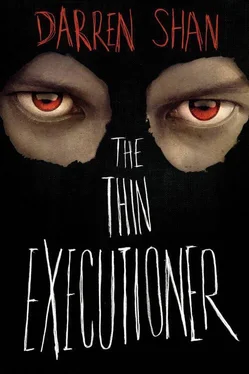“I’ve never seen her before,” Jebel laughed. “But I’m replacing her anyway. It’s my right and I demand it.”
The high lord stared dumbly at the boy. Then his face hardened. “So be it. Woman, leave this place — you’re free.” She didn’t need to be told twice, and scurried off the platform. Wadi Alg sneered at Jebel. “Assume the position, fool.”
“Gladly,” Jebel said, moving behind the block and kneeling down. “But before I do, may I ask who you plan to appoint to execute me?”
Wadi Alg faltered. His gaze fell on Rashed Rum.
“Not I, my lord,” Rashed said. “I would execute this pup gladly — he has shamed me today — but if my hand shook and I failed to kill him, people would question my loyalty.”
“Then who…?” Wadi Alg looked around, and his eyes fell on Zarnoug Al Dahbbeh. “You!” he roared. “You were the last to be eliminated. If you behead this traitor, you can take his place as the high executioner.”
Zarnoug Al Dahbbeh didn’t hesitate but marched to the platform and made for the axe. He seized it with both hands and, without any formalities, swung it up and around and brought the blade down on Jebel’s neck— thwack! — with enough force to sever it in one mighty blow.
But Jebel’s neck held. More than that — it stopped the blade dead, and a shudder ran up Zarnoug Al Dahbbeh’s arms, as if he’d struck iron. He got such a shock that he dropped the axe and took a frightened step back. All those watching had opened their mouths to cheer, but now those mouths closed slowly, in silence.
Jebel looked up and smiled. “One blow down — two to go,” he said, and put his head back on the block.
Zarnoug Al Dahbbeh knew it was a waste of time, but he struck twice more before laying the axe aside and stepping down from the platform, to return to Abu Judayda and tell the tale of the invincible Jebel Rum to his disbelieving peers.
Jebel stood and faced the hate-filled crowd. He rubbed the back of his neck and grimaced. He might be invincible, but the blows had stung nevertheless.
“I survive,” Jebel said, and he didn’t have to raise his voice to be heard. “And since I won the mukhayret, replaced the woman on the block, took my three blows, and was not killed, I believe I’m still the executioner. Father? Is that correct?”
Rashed Rum looked like he wanted to strangle his youngest son, but he nodded reluctantly. “You can’t be removed from your post until you retire, commit a crime, or die. That is the way it has always been.”
“And it’s no crime to ask to replace a convicted criminal, is it?” Jebel pressed.
Rashed Rum shook his head. “Unfortunately, no.”
Jebel faced Wadi Alg. “Do you accept me as your new executioner?”
“No!” the high lord barked.
Jebel raised an eyebrow. “On what grounds do you turn me down?”
“On… on…” Wadi Alg looked for support among his counselors, but none of his advisers met his gaze. When he saw that the decision was to be his alone, the high lord’s shoulders slumped. “I’ll find a way to get rid of you,” he snarled. “I’ll uproot an ancient law, no matter how far back I have to search.”
“Perhaps,” Jebel said. “But for now, do you accept me?”
“It seems that I have no choice,” Wadi Alg sniffed.
“Then all that remains is for me to pick a wife.”
Jebel looked to where Debbat Alg stood with Bastina. The high maid’s face was a mask of rage. She hated Jebel with all her heart. She knew that he was going to pick her to be his wife. The thought of being married to this fool who’d insulted her father and the city of Wadi filled her with fury. She would make his life a living hell, never give him a child, and try to murder him in his sleep every night. Debbat would find out just how invincible this infidel really was!
Next to the high maid, Bastina was smiling. For the first time at an execution she had something to be happy about. Her face lit up as she thought about all the lives Jebel would save. She had always known there was mercy and compassion in him, just waiting to get out. Now it had, in the most spectacular fashion. Thinking about it made her laugh out loud.
Jebel was surprised to see Bastina laughing, but her reaction made him chuckle. He glanced at Debbat Alg again, and her furious glare made him laugh even louder. Looking around, he saw similar expressions on the faces of the other maids in the square, and he collapsed with giggles. What a glum bunch they were!
Shaking his head, Jebel wiped tears of mirth from his eyes, then faced Debbat Alg and Bastina once again. Smiling shyly, he pointed to the most beautiful girl in Wadi and said, “I choose her, if she’ll accept me.”
And when she did, off the pair went to be wed.
Years blew away like leaves in an autumn storm. Ten, fifteen, twenty. Jebel got older and taller but never much fatter. He would always be a thin executioner. His wife said that he would be as thin as an insect until the day he died, and he supposed she was right. She normally was.
Wadi Alg never did find a law to oust Jebel Rum, and although he considered rewriting the laws, that would have been a dangerous move. Once a high lord started changing the rules by which he governed, people grew nervous and wondered what laws he might focus on next. It was simpler to just grumble about Jebel along with everybody else.
Jebel hadn’t missed a day’s work since winning the mukhayret. Every morning he turned up at the executioner’s platform and waited for that day’s criminals to be led forward. In the early years there had been many, and he had offered his life for each, taking their place on the block, surviving the blows, and getting on with his job again. Many had tried to behead him — the high lord had offered great riches to anyone who could rid the city of Jebel Rum — but none had succeeded.
Of late, Jebel was only occasionally called upon to place his head on the block. That wasn’t because crime had dropped in Wadi. On the contrary, it had increased sharply. The trouble with setting every criminal free was that many broke the law again. Wadi had become a cesspit, a beacon to all the scum of Abu Aineh, who flocked to the city, safe in the knowledge that they couldn’t be punished for their crimes.
But when Wadi Alg was killed by an assassin who laughed as he walked free, his replacement was determined not to suffer the same fate. He made a pilgrimage to Jebel’s house and begged the executioner to reconsider. The city had become a foul stain upon the landscape. Didn’t Jebel care? Wasn’t he concerned?
Jebel said that of course he was alarmed, but still he wouldn’t kill. When the high lord lost his patience and asked how Jebel suggested they put a stop to the madness, Jebel told him of the penal customs of other nations, how they built jails to lock up criminals. The high lord protested, but when he considered his options afterwards, he saw that it was the only way forward.
Nobody thought that the prisons would work, but they did. If they were sturdily built and properly manned, escape was almost impossible, and if you sent someone there for the rest of their life, that person ceased to be a problem. At first the judges of Wadi issued life sentences to every criminal, but it quickly became clear that they couldn’t afford to house and feed so many convicts, so they began to introduce shorter sentences for lesser crimes. Some suggested floggings or amputations, but those were the remit of the executioner, and Jebel refused all such requests.
Gradually the prison system flourished in Wadi, and it was even taken up by other towns in Abu Aineh — by fining the wealthier criminals and charging rent for their enforced stay, a prison could turn a profit, and no Um Aineh had ever said no to that. The streets began to feel safe again, and life went on as before, only without the executions.
Читать дальше







